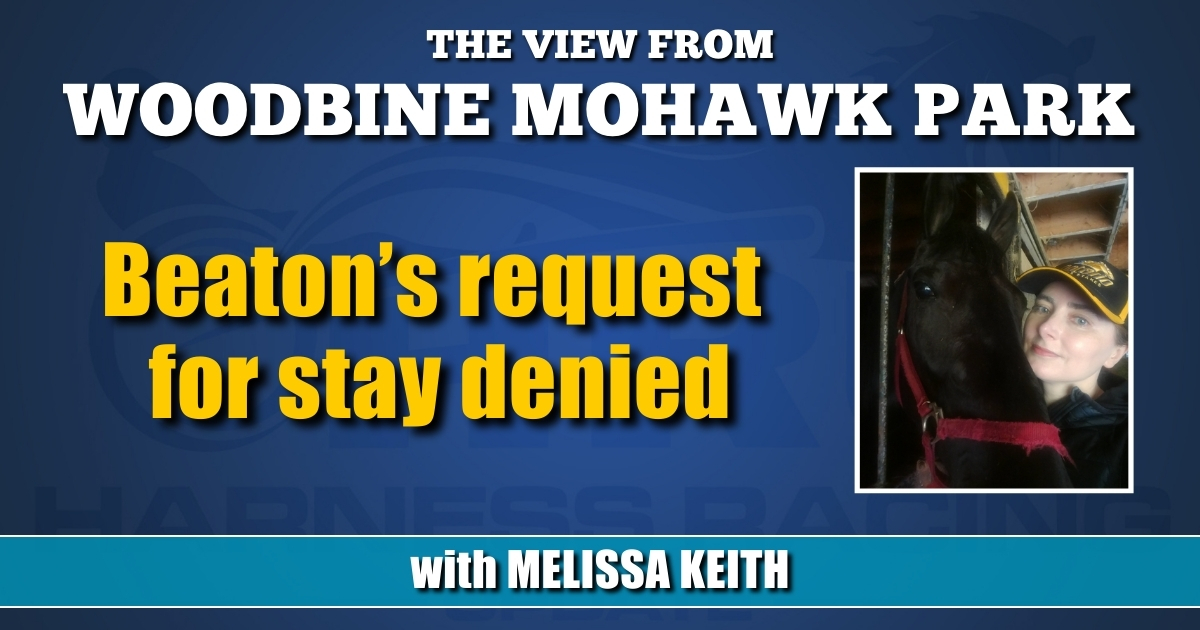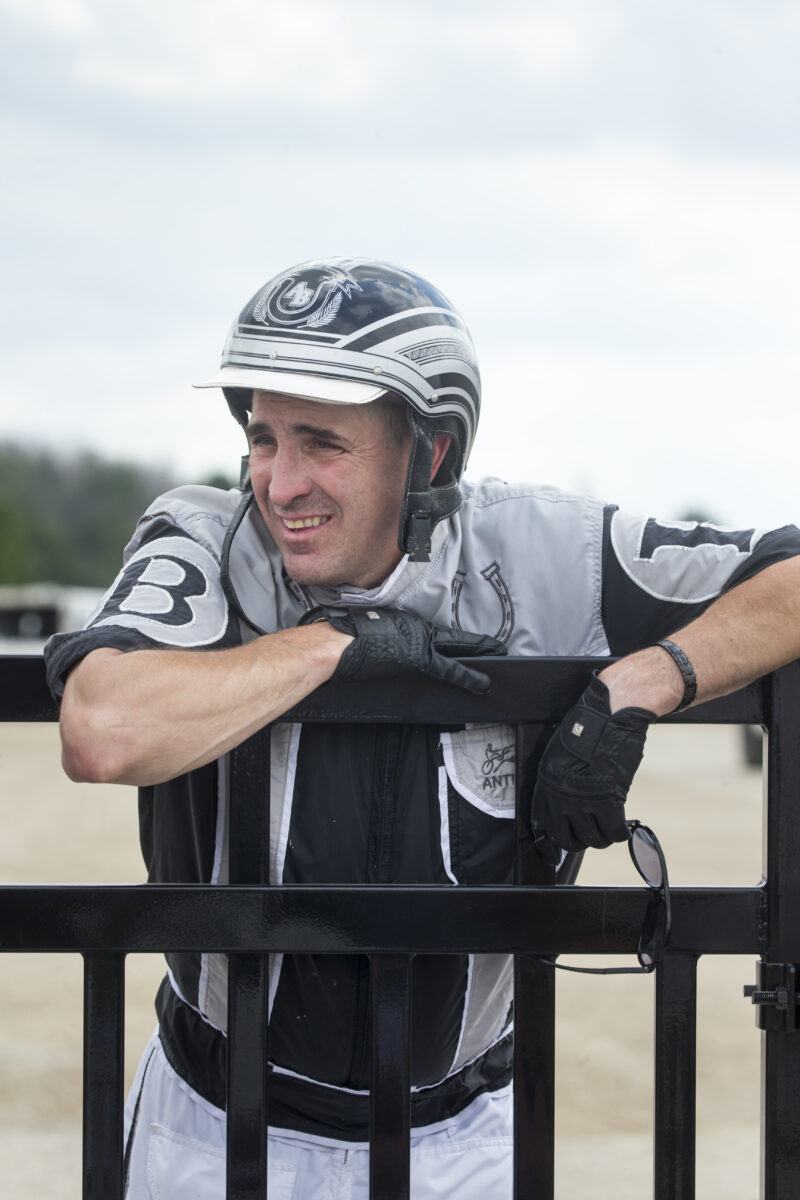Beaton’s request for stay denied
Trainer Anthony Beaton’s hearing in the appeal of his two-year suspension for alleged animal cruelty will resume in January.
by Melissa Keith
On Friday (Dec. 15), the Ontario Horse Racing Appeal Panel (HRAP) denied a request for a stay in the case of trainer Anthony Beaton. On the third day of the appeal hearing, HRAP chair Stanley Sadinsky considered the request by Beaton’s lawyer Jean-Marc MacKenzie, but ultimately ruled that granting a stay “at this stage” of ongoing proceedings would not send a clear message that equine welfare and racing integrity was “the overarching consideration” in his decision.
On Monday (Dec. 11), the Alcohol and Gaming Commission of Ontario (AGCO) announced it had suspended Beaton for two years, based on the events of Oct. 12, 2023 that led to an immediate, indefinite suspension being announced right before the Oct. 13 Ontario Sires Stakes Gold Super Final card at Woodbine Mohawk Park. What led to the sudden suspension was not disclosed at that time. As previously reported in HRU, the trainer’s horses were all scratched that weekend.
On Wednesday (Dec. 13), Beaton’s appeal hearing began.
“This case is about an issue that’s central to the viability of horse racing, which is upholding the welfare of horses, and being seen to do so, in the eye of the public,” said Elizabeth Maislish in her opening remarks. The Counsel for the Registrar noted that the previous AGCO ruling had been rescinded, “until a detailed inspection could be completed for the purposes of determining eligibility under the Horse Racing License Act.” She said that on Dec. 6, the AGCO ruled that Beaton’s conduct violated rules against “cruelty or neglect to a horse, whether on or off the grounds of the association” and “conduct prejudicial to the best interest of racing.”
Maislish stated: “It is our view that there can be no accommodation for cruelty and mistreatment of a racehorse, or a horse whatsoever, under the [AGCO] Rules of Racing, and this must be so, irrespective of a licensee’s financial motives in training a yearling as quickly as possible, and that no one is immune from these obligations, irrespective of their personal status or reputation.” Severe or permanent injury was not necessary for an act to be considered cruelty, she added.
MacKenzie argued that, “the elements alleged [Dec. 6] are entirely distinct from the elements in the original [Oct. 13]; the new charges require cruel, malicious intent, cruel act injury, but the case built by the register establishes neither.” The Counsel for the Appellant added that the charges instead, “show ignorance of the panel’s decisions in the past regarding [rule] 622, the definition of cruelty in the standardbred racing industry… They fail to provide the basis that the definition of cruelty should be based on non-industry-related legislation.”
He said that a “Webster’s dictionary” or Animal Welfare Act definition of “cruelty” did not fit the agricultural context.
“The whole case is really on a policy claim,” he argued. “They want you to make a policy decision on the welfare of the horse… We all have concerns for the welfare of this horse. What they fail to focus on is this happened in the context of this horse going down three times, up and down, throwing him [Beaton] out of the bike. You’re trying to adjust behavior… This is a case about a trainer that’s experienced, trying to do what they do… It’s a very dangerous thing, training yearlings.”
MacKenzie’s opening remarks touched on what multiple witnesses had reported seeing on Oct. 12, 2023 at Classy Lane Training Centre in Puslinch, ON: Beaton, accompanied by three employees, getting rough with a stubborn yearling colt on a roadway between two barns.
“This is not the case to start defining ‘what is a training practice, now?’ It’s saying that you can do corrective training practices, up to striking [a yearling]. That’s concerning for this industry and concerning for my client, because that has not been the standard… Here we have a situation where a horse is going up and down, putting participants at risk, putting the horse at risk, and whip is not to [be used] to adjust behavior?”
The yearling in question was a colt named Wait In The Truck, whom Beaton had purchased under the name Online Bettor at the Lexington sale, a week prior to the incident at Classy Lane. Mackenzie said that Beaton had done what was necessary to get the horse back on its feet and prevent the formation of bad, even dangerous habits at a young age, adding, “you can argue it was a textbook case of how to try to help a horse… This is not a case of cruelty with intent.”
The first witness to address the panel was Katelyn Abt, a caretaker working for trainer Rick Zeron, whose stable faces Beaton’s at Classy Lane. She testified that she saw Beaton “whipping the yearling to get it up… then after the pulling and the whipping didn’t work… Anthony Beaton whipped it more.” She said she saw the events while doing her own barn chores, including when Wait In The Truck “wasn’t really moving” which she speculated “aggravated Mr. Beaton more, because it wasn’t trying to get up.” She said she later saw the colt put on a walker (Equicizer) for “quite a while.”
Abt said she provided a statement to AGCO inspectors at Woodbine Mohawk Park.
“They summoned us all in and if we didn’t [speak with inspectors], then we would be revoked of our racing privileges,” she said.
Longtime licensed trainer Glenn Lalonde was the next witness to answer questions from both sides. He said he currently worked for trainer Dave Menary at Classy Lane, and had recently helped him break 16 yearlings.
“I didn’t see excess use of the whip, just flicking him,” said Lalonde. He did tell the panel he had concerns with what happened later on: “I wouldn’t have put him on the walker. That’s what upset me… By putting the horse on the walker, you’re basically punishing the horse for something he didn’t know that he did.”
AGCO judge Dave Stewart was asked by HRAP member John Charlambous about the “anonymous text” with 10 photos he received when he was officiating at Flamboro Downs, which set off the investigation into the incident at Classy Lane.
“As far as I know, they only spoke to me. I don’t know the identity of that person,” said Stewart, adding that he received a second text from the anonymous source around 11:30 p.m. on Oct. 12, “saying that they had done their own research in hopes of identifying the identity of the horse” by markings.
Dec. 14 (Thursday), Renee Samson, another caretaker working for Rick Zeron, said she had observed “bits and pieces” of what went on between Beaton and Wait In The Truck. She said she “didn’t want to get involved” because of “backlash about us being rats,” but AGCO investigators “said they’d suspend [her] license if I didn’t” say something. Samson stated that she had seen the colt down and “saw Tony [Beaton] walk around to the front of the horse, kind of give him a few smacks on the head.”
Clay Martin, an officer with the former Ontario Provincial Police, now AGCO, Equine Drug Program, said he visited Classy Lane on Oct. 13 to investigate. He told the panel that he was initially shown another colt, Wicked Turns, by Beaton, before another investigator found Wait In The Truck a few stalls down. Martin said he saw “marks that [he] had never seen on a horse before” which seemed to be put there by a “long instrument.”
A recording of Beaton’s Oct. 13 interview with AGCO investigators was played.
“We do have to get this horse’s behavior a little better,” he said in the recording. “We did slap him with the whip. I agree, we shouldn’t do that… We did put him on the wheel [Equicizer], but it certainly wasn’t an hour.” He said the colt spent 15 to 20 minutes on the walker, after having dropped to the pavement and gotten up repeatedly in a walkway area.
The trainer expressed regret in his recorded testimony.
“That’s the last thing in the world that I want, to be rough with a horse…” he said. “That’s not me… I lost my cool… It’s a poor excuse… a bad decision on my behalf.”
He told investigators at the time that he considered some complaints about the incident “to be a little exaggerated,” and that discipline is essential in the making of a racehorse: “You hate to lose [to the horse] when you’re breaking
a baby.”
On Friday (Dec. 15), the panel heard from Dr. Pamela Chesterfield, manager of veterinary services for the AGCO.
“When I arrived [at Classy Lane on Oct. 13], I was with [AGCO investigator] Brian Van Veen, and Clay Martin and [AGCO] manager of racing Diane Moretti arrived shortly after…” Chesterfield said. “When we arrived at the farm, we made our way to Anthony Beaton’s stable area.”
She conducted an exam on the Wait In The Truck, whom she testified had not been treated with anti-inflammatories or other medication beforehand.
She said Beaton told her that some of the colt’s abrasions were “as a result of the horse being down on the pavement.” She described other injuries, such as a swollen upper and lower eyelid on the left side, and marks inside the colt’s hind legs, as well as abrasions to both the colt’s hocks, which she determined to be from the Equicizer. When questioned by MacKenzie about whether some of the marks observed could be from “how yearlings are in the stall”, she replied “yes.”
Several witnesses were unable to take part in the three-day Zoom hearing, due to medical reasons, family tragedy, and having inadvertently heard other witnesses testifying.
HRAP chair Sadinsky determined that the hearing was to continue in January 2024, with dates to be announced later.


















